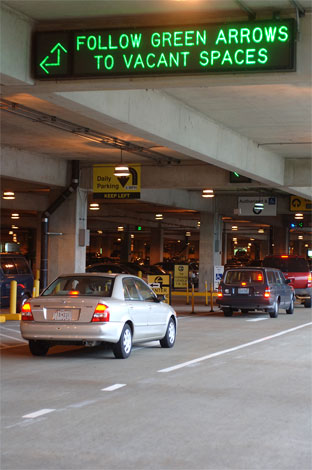Cutting edge transportation technologies like real-time bus trackers and intelligent parking systems could be coming to a city near you thanks to a new bill before the House Committee on Transportation and Infrastructure. Lawmakers are considering establishing a pilot, competitive grant program that would bring time-, money- and pollution-saving technologies to six cities.

Existing technologies allow cities to coordinate traffic lights, warn highway commuters about crashes and point drivers to available parking spaces, explained Scott Belcher, president and CEO of ITS America, in a hearing before the committee this morning. These technologies can have a big impact on the efficiency of our transportation systems, potentially reducing the need for new infrastructure, said Belcher.
"Smart" transportation technology has been shown to reduce congestion and accident rates by 10-15 percent, according to an analysis by USDOT [PDF]. The same report showed transit systems taking advantage of real-time data were able to reduce their fleets by 2-5 percent. Schedule adherence on the part of transit agencies was also positively affected by as much as 9 to 23 percent, according to the report.
If adopted, the legislation would enable cities and rural areas to compete for grant funding through USDOT, according to Russ Carnahan (D-MO), the bill's sponsor.
"These great ideas about intelligent transportation have been sort of sitting on the shelf but they haven’t been implemented into our transportation strategies," said Carnahan. "This is a great opportunities to get these into American communities so that we can show their value."
Lawmakers are awaiting analysis from the Congressional Budget Office on the cost of such a program. It is too early, as well, to say what the exact criteria will be for competing cities, although Belcher said the program will likely take into account each proposal's potential to reduce cost, boost operational performance, improve safety, reduce environmental impact and provide economic benefit at a low cost.
Carnahan said the bill has bi-partisan support, thanks to its potential for savings. An GAO analysis cited by Belcher found that smart technologies have a nine-to-one return on investment. Transportation for America also examined the myriad potential transportation improvements offered by technological innovation in a report last year.
For example, instituting systems that could electronically collect transit fares could save $5.9 million in Seattle, $2.4 million in Cincinnati and $1.1 million in Tuscon, according to an analysis by USDOT. Other available technologies allow communities to install weather-activated fixed road salting equipment or use electronic toll collection to enforce variable pricing on congested freeways.
When questioned about the prospects of pushing new spending through a budget-conscious Congress, Carnahan was optimistic.
"The question is, can we afford to continue to make the transportation investments we are making without the better technology?" he said. "I don’t think we can do that."





